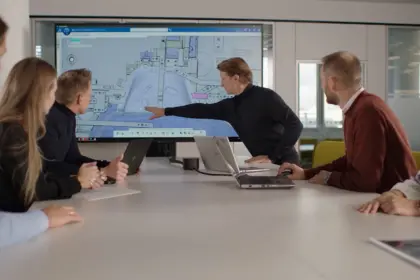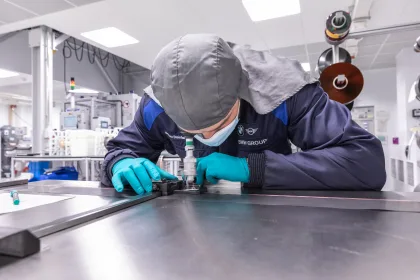The BMW Group is endowing RWTH Aachen University with a new professorship in “Quantum Information Systems” in the Department of Computer Science. Last Wednesday saw the official inauguration of Prof Dr Dominique Unruh, who will head the chair. In addition, the funding of an endowed chair at the Technical University of Munich (TUM) has already been approved for 2021. The Chair of Quantum Algorithms and Applications will be headed by Prof. Dr Barbara Kraus.
Alexander Buresch, Senior Vice President BMW Group IT, explains the BMW Group’s commitment: “Our goal is to create an open software ecosystem that optimally integrates quantum software and hardware and thus accelerates the industrialisation of automotive applications. This is precisely where endowed professors at universities such as the Technical University of Munich and RWTH Aachen make an important contribution to jointly creating pioneering innovations.” While the TUM chair lays the algorithmic foundations for industry-relevant applications, the RWTH chair creates concrete software solutions and the necessary software expertise.
Over the past seven years, the BMW Group’s commitment to research into quantum computing has led to an increasingly far-reaching understanding of the technology. At the same time, the company is reaching the limits of conventional hardware due to ever larger and more complex optimisation problems, simulations and applications of artificial intelligence. The BMW Group is an established part of the quantum computing ecosystem and an innovation leader in the automotive sector. With a targeted collaboration strategy, the BMW Group is utilising synergies and driving forward the field of quantum computing research while already exploiting the advantages of this technology in its value chain.
“For years, we have been involved in many consortium projects in the fields of battery production, artificial intelligence and system engineering, in bilateral contract research and in the joint organisation of education and research, and now we are also increasingly active in the promising field of quantum computing technology. As a mentor for this exciting and important future topic for the BMW Group, I am looking forward to working with Prof Dr Unruh and Prof Dr Kraus and to the results of our joint research,” says Stefan Floeck, Senior Vice President Product Line MINI and Compact Class BMW.
Powerful optimisation algorithms, simulations and artificial intelligence in the areas of planning, production and logistics – this requires more and more computing power due to the growing complexity and problem sizes. Quantum computing was identified back in 2017 as a potential answer to the end of Moore’s Law, which means that the computing power available worldwide will no longer continue to increase exponentially as before. The BMW Group therefore established a dedicated quantum computing team that is already contributing to the company’s value creation by reformulating real-world problems from development, production, distribution and many other areas and solving them with quantum (inspired) algorithms. In collaboration with Amazon Web Services, for example, the movements of robot arms during the sealing of the underbody were optimised and it was discovered that quantum computing-inspired algorithms have the potential to reduce the cycle time at the Munich plant by up to 10%.
Other promising use cases include the simulation of battery and fuel cells, numerical simulations of vehicle aerodynamics and acoustics, efficient training of machine learning models and many other areas. Today, the processing of such computationally intensive processes often represents the bottleneck in the development of new applications and products.
The BMW Group is a co-founder of the QUTAC consortium, in which eleven of the largest German companies are working together to advance quantum computing from an industrial perspective and conduct application-related research. The BMW Group is also a member of a total of four funded projects that bring together excellent academic partners with commercial enterprises and start-ups with different focuses in order to investigate the potential of quantum computing using real industry use cases.















